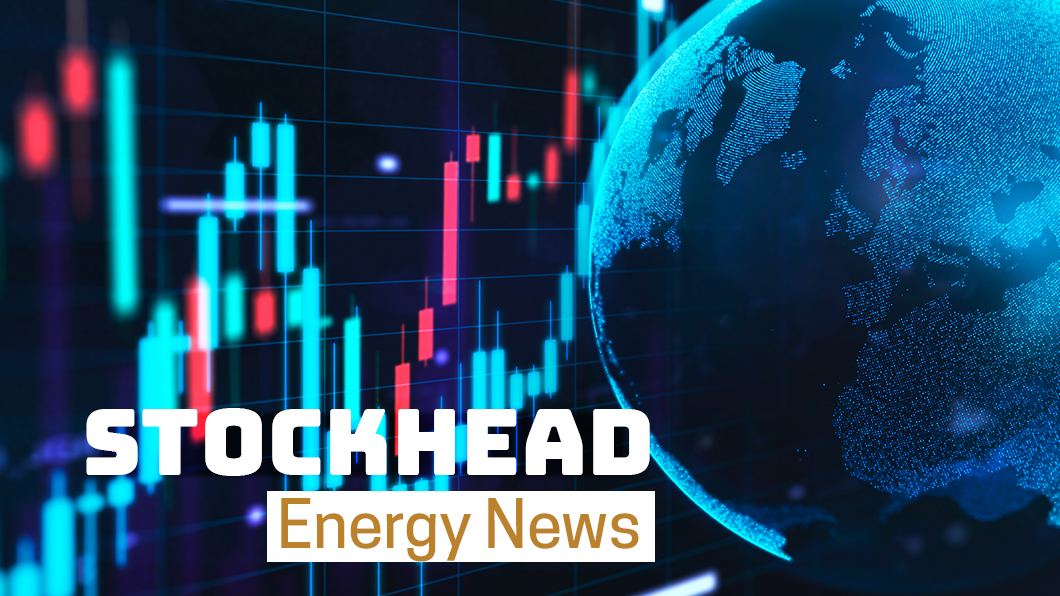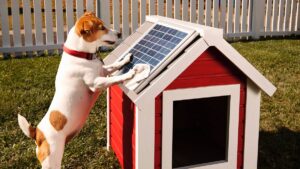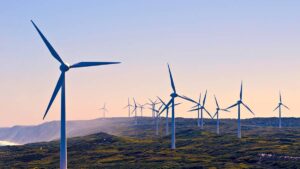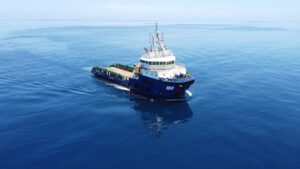Emission Control: Here’s a solution for a big polluter – masks to capture cow burps

Pic: Yuichiro Chino / Moment via Getty Images
- UK-based ZELP receives award for cow masks, designed to capture the methane gas emitted from cow burps
- ‘Green lanes’ for travellers between Singapore and New Zealand could soon be a thing
- And Hazer Group’s Canadian hydrogen project inks $8m in funding from the Canadian province of British Columbia
Cow burps are a big source of pollution.
The world currently has around 1.6bn cattle, each emitting 400 litres of methane per day. But London-based agricultural service, ZELP (Zero Emissions Livestock Project), has designed a wearable device which neutralises methane emissions in real time.
As one of four winners of the Terra Carta Design Lab award – associated with the Royal College of Art in the UK and Prince Charles’ Sustainable Markets Initiative – ZELP reckons these cow masks can reduce methane emissions from belches by more than 50%.
The technology oxidises methane into carbon dioxide and water vapour and significantly reduces the global warming potential of methane gas.
Data is captured throughout the life of the animal to optimise welfare on the farms, improve productivity of the animals and generate robust greenhouse gas (GHG) inventories.
ZELP grabbed the attention of Jony Ive, the former design chief at Apple, as well as Prince Charles. Both sat on the Terra Carta Design Lab grand jury.
Other winners include The Tyre Collective, which is developing the first patent-pending device to capture tyre wear at the wheel, accelerating the shift to zero emission mobility, and Aerseeds – the designers behind aerodynamic seed pods made from food waste.
By mirroring natural processes, the seed pods are carried by the wind to cover large areas and reach difficult terrains where they deliver nutrients and seeds to soils depleted by human activity.
Origin accelerates renewable energy growth with up to 1GW in the pipeline
Origin, one of Australia’s largest energy companies, recently announced two acquisitions – the large scale Yarrabee Solar Farm in SW and Carisbrook Solar Farm – totalling close to 1GW as it continues its path towards a coal free future.
The first stage of Yarrabee is expected to comprise 450 MW, with the potential for up to 900 MW under the planning approval obtained from the NSW government in December 2018.
Origin says it sits within an important part of the Transgrid transmission network, which is targeted for substantial upgrades to facilitate Snowy 2.0 and the South-West Renewable Energy Zone.
Carisbrook is set to reach commercial operations in 2023, subject to a final investment decision and other required approvals.
Origin executive Greg Jarvis said the team continues to focus on the multi-gigawatt opportunity to grow renewable energy and storage, through developing greenfield sites or acquiring advanced stage pre-construction renewable projects like Yarrabee.
Will ‘green lanes’ be trendier than first-class travel?
Last week New Zealand Prime Minister Jacinda Arden announced a New-Zealand-Singapore Sustainable Aviation agreement supporting sustainable aviation fuel (SAF) uptake and the electrification of fleets, along with airport infrastructure.
The Sustainable Aviation Agreement forms part of a new ‘green pillar’ in the Singapore-New Zealand relationship whereby ‘green lanes’ for travellers between the countries would be considered to help encourage consumer use of flights powered by sustainable aviation fuels.
Information sharing on approaches to decarbonise airport infrastructure and optimise air traffic routes will be implemented, along with a study to assess the commercial viabilities of developing ‘green lanes’ and the coordination of testing and trialling sustainable fuels (including hydrogen) to guide the development of the sustainable aviation ecosystem.
Air New Zealand, Auckland Airport, Christchurch Airport and the Board of Airline Representatives New Zealand all committed to the agreement.
“We cannot afford to return to business as usual, because that is unsustainable. We need to work with trusted partners like Singapore to ensure that environmental sustainability is a core part of our economic strategy,” Ardern said.
“The commitments made today are a concrete demonstration of the government and private sector joining together to build a more sustainable future.”
The Sustainable Aviation Arrangement also builds on the Hydrogen Arrangement, signed in 2021, which lays the foundation for information exchange on the use and deployment of low-carbon hydrogen across energy and transport sectors.
This includes exchanges on low-carbon shipping policy, and on encouraging the rapid uptake of zero and low emissions vehicles.
Here’s how ASX renewable energy stocks are tracking today:
| CODE | COMPANY | PRICE | 1 WEEK RETURN % | 1 MONTH RETURN % | 6 MONTH RETURN % | 1 YEAR RETURN % | MARKET CAP |
|---|---|---|---|---|---|---|---|
| MR1 | Montem Resources | 0.04 | 18% | 11% | -50% | -64% | $9,787,320.51 |
| FHE | Frontier Energy Ltd | 0.28 | 17% | 12% | 115% | 100% | $57,257,875.50 |
| GNX | Genex Power Ltd | 0.15 | 7% | 0% | -35% | -29% | $200,850,685.30 |
| IFT | Infratil Limited | 7.69 | 2% | 2% | -4% | 17% | $5,634,604,893.75 |
| QEM | QEM Limited | 0.25 | 0% | 32% | 25% | -2% | $26,654,483.26 |
| RFX | Redflow Limited | 0.039 | 0% | -13% | -34% | -44% | $57,534,499.12 |
| SRJ | SRJ Technologies | 0.43 | 0% | 0% | 13% | 54% | $31,927,138.80 |
| M8S | M8 Sustainable | 0.022 | 0% | 22% | -8% | -23% | $9,228,559.12 |
| FMG | Fortescue Metals Grp | 21.6 | 0% | 12% | 54% | -6% | $61,887,194,851.80 |
| CWY | Cleanaway Waste Ltd | 3.175 | -1% | 5% | 15% | 21% | $6,538,402,672.98 |
| RNE | Renu Energy Ltd | 0.05 | -2% | -15% | -22% | -31% | $17,723,788.05 |
| MEZ | Meridian Energy | 4.4 | -2% | -6% | -8% | -15% | $5,451,331,924.80 |
| LIT | Lithium Australia NL | 0.1025 | -2% | -11% | -21% | -18% | $103,476,122.40 |
| DEL | Delorean Corporation | 0.165 | -3% | -23% | -13% | -37% | $35,045,307.56 |
| ECT | Env Clean Tech Ltd. | 0.032 | -3% | -11% | 100% | 60% | $51,136,305.36 |
| NEW | NEW Energy Solar | 0.7925 | -4% | -13% | -2% | 0% | $254,867,448.87 |
| CNQ | Clean Teq Water | 0.59 | -5% | -5% | -16% | 0% | $27,916,358.75 |
| HZR | Hazer Group Limited | 0.89 | -5% | -3% | -36% | -35% | $146,607,474.60 |
| IRD | Iron Road Ltd | 0.175 | -5% | -8% | -10% | -40% | $143,625,633.48 |
| LPE | Locality Planning | 0.07 | -5% | -22% | -58% | -70% | $11,639,474.05 |
| KPO | Kalina Power Limited | 0.03 | -6% | 15% | 11% | -30% | $43,841,561.57 |
| EDE | Eden Inv Ltd | 0.014 | -7% | -22% | -33% | -58% | $32,425,506.93 |
| MPR | Mpower Group Limited | 0.034 | -7% | -6% | -52% | -70% | $7,552,078.16 |
| EOL | Energy One Limited | 6.05 | -7% | -7% | -5% | -1% | $167,550,913.12 |
| CXL | Calix Limited | 8.475 | -8% | 10% | 63% | 261% | $1,374,006,856.65 |
| CPV | Clearvue Technologie | 0.325 | -8% | -7% | 20% | -61% | $69,874,313.52 |
| GEV | Global Ene Ven Ltd | 0.0915 | -9% | -6% | -32% | -13% | $49,003,241.85 |
| PRL | Province Resources | 0.096 | -9% | -9% | -38% | -53% | $107,708,862.42 |
| VUL | Vulcan Energy | 8.32 | -9% | -19% | -44% | 1% | $1,129,514,872.20 |
| AVL | Aust Vanadium Ltd | 0.071 | -10% | 9% | 184% | 223% | $246,508,327.80 |
| PGY | Pilot Energy Ltd | 0.0305 | -10% | -36% | -58% | -63% | $16,140,489.98 |
| BSX | Blackstone Ltd | 0.365 | -11% | -10% | -47% | 0% | $166,937,885.58 |
| PRM | Prominence Energy | 0.0115 | -12% | -18% | 5% | -45% | $24,246,088.19 |
| NMT | Neometals Ltd | 1.59 | -12% | -8% | 64% | 207% | $860,950,941.72 |
| PH2 | Pure Hydrogen Corp | 0.4 | -12% | -12% | 14% | 48% | $138,391,578.41 |
| EGR | Ecograf Limited | 0.49 | -13% | -11% | -22% | -18% | $234,173,398.68 |
| LIO | Lion Energy Limited | 0.044 | -14% | -15% | -46% | -31% | $18,748,849.81 |
| TNG | TNG Limited | 0.075 | -15% | 6% | -42% | -22% | $105,519,784.87 |
| FGR | First Graphene Ltd | 0.14 | -15% | -18% | -31% | -46% | $83,987,066.40 |
| NRZ | Neurizer Ltd | 0.195 | -15% | 26% | 63% | -7% | $180,660,254.17 |
| HXG | Hexagon Energy | 0.038 | -17% | -28% | -57% | -75% | $16,071,092.39 |
| AST | AusNet Services Ltd | 0 | -100% | -100% | -100% | -100% | $9,919,608,018.74 |
| SKI | Spark Infrastructure | 0 | -100% | -100% | -100% | -100% | $5,036,718,783.60 |
Whose got news out this week?
Hazer Group (ASX:HZR)
The company behind the ‘Hazer Process’, a low emission hydrogen and graphite production process has announced that its Burrard Hazer Hydrogen Project has secured up to C$8mn in funding from the Canadian province of British Columbia.
Burrard is a collaboration between FortisBC Energy Inc. (FortisBC), Suncor Energy Inc. and Hazer Group and is set to be a leading demonstration of the Hazer Process.
When established, the project will process natural gas feedstock to produce 2,500 tpa low-carbon emission hydrogen and around 9,000 tonnes of synthetic graphitic carbon by-product.
The initial Feasibility Study stage of the project kicked off in February ahead of a final investment decision (FID) in 2023 with operations targeted to commence in 2025.
HZR CEO Geoff Ward said emerging technologies such as the Hazer process will play a critical role in the successful transition to a low-carbon economy.
“The support of the government of British Columbia is greatly appreciated as we accelerate the development of the Hazer technology,” he said.
Environmental Clean Technologies (ASX:ECT)
Melbourne-based ECT has been developing net zero emission and hydrogen technologies for more than 15 years.
Today, the company signed a binding joint venture agreement (JVA) with GrapheneX to support the Phase 2 rollout of ECT’s Bacchus March COLDry technology demonstrator which will produce net-zero hydrogen from lignite syngas and hydrogen derivative products from lignite and waste biomass blends.
To support the rollout, firm commitments from sophisticated investors have been received to raise $5 million under a placement joint led by Kaai Capital and Peak Asset Management.
GrapheneX will commit to supplying a multi-feedstock 39MW turbine to be installed at ECT’s Bacchus Marsh site and will also supply funding of $3.5m for the installation of the turbine and the formic acid process equipment.
ECT managing director Glenn Fozard said once installed, the process will be the largest production capability from lignite or otherwise known as brown coal.
“Add to that the largest demonstration of low emission electricity from lignite syngas, and we have a site of national significance,” he said.
“ECT shareholders and GrapheneX should be proud of this proposed development and the facility’s national profile will support increased interest from both industry and government.”
The Bacchus March COLDry Project, similar to the HESC project – where hydrogen is produced from coal at a newly constructed plant located at AGL’s Loy Yang Complex in the Latrobe Valley, aims to be a fully integrated supply chain solution for hydrogen.
However, the key difference for ECT’s project is that instead of focusing on high purity hydrogen, it will focus on hydrogen derivatives, which the company says solves the immediate storage and transportation challenges.
“The project does not require the CCS infrastructure that is being planned to curtail emissions at Blue Hydrogen projects,” the company said.
“By eliminating two of the biggest challenges facing the immediate deployment of hydrogen production plants, the Project allows ECT and GrapheneX to focus on technical scale up, commercial optimisations and further emissions and waste improvements.”
The company says the process being developed by ECT and GrapheneX is in a hydrogen colour category of its own due primarily to its net-zero emission profile without the need for CCS, thereby claiming and introducing a new colour to the rainbow – ‘viridian’.
The critical point of difference is the effective transformation of lignite, combined with waste biomass, into a valuable multi-product stream:
- Clean energy – hydrogen and low emission electricity
- Soil health – agricultural char
- Critical minerals – graphitic carbon, battery anodic carbon and graphene
Renewable energy stocks share price today
Related Topics
UNLOCK INSIGHTS
Discover the untold stories of emerging ASX stocks.
Daily news and expert analysis, it's free to subscribe.
By proceeding, you confirm you understand that we handle personal information in accordance with our Privacy Policy.








